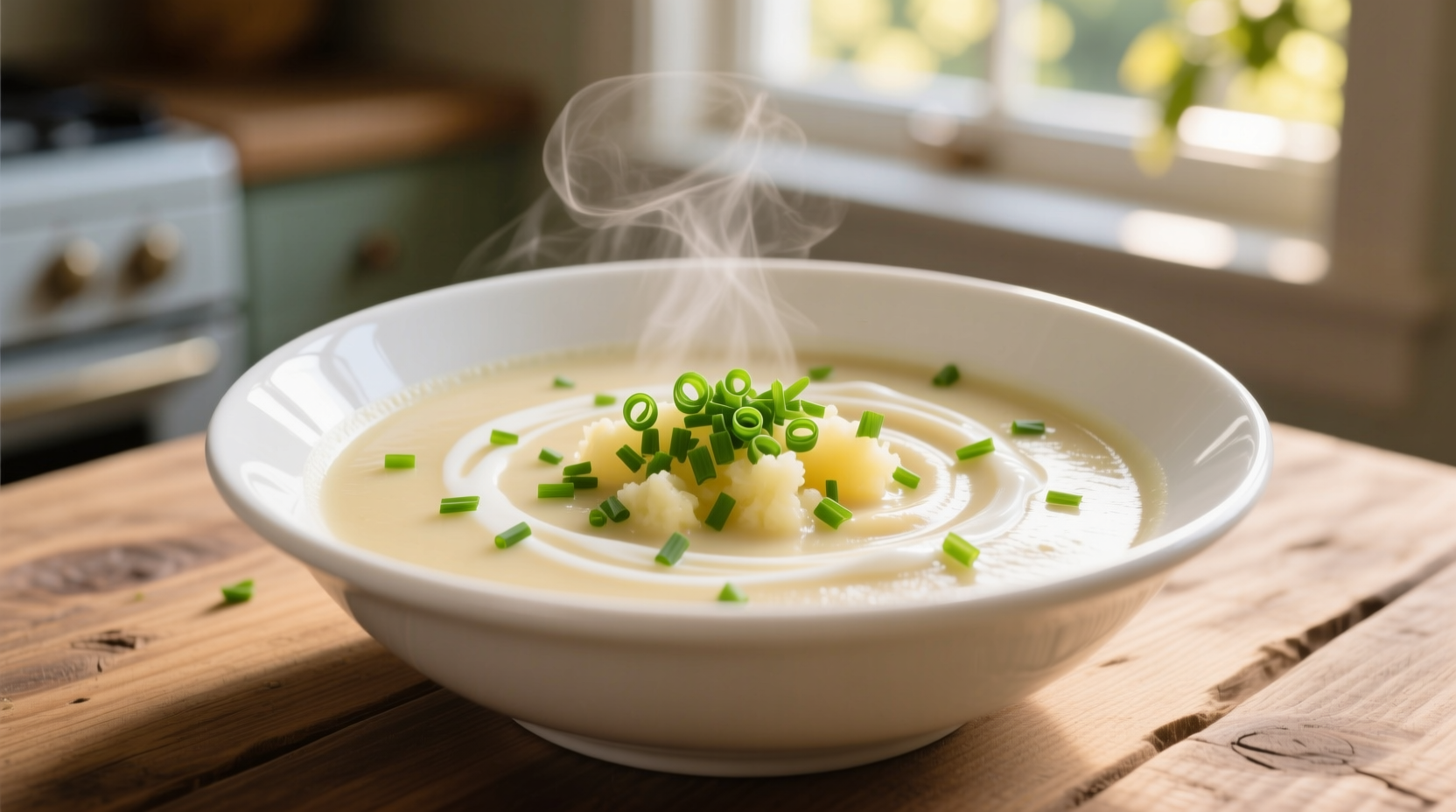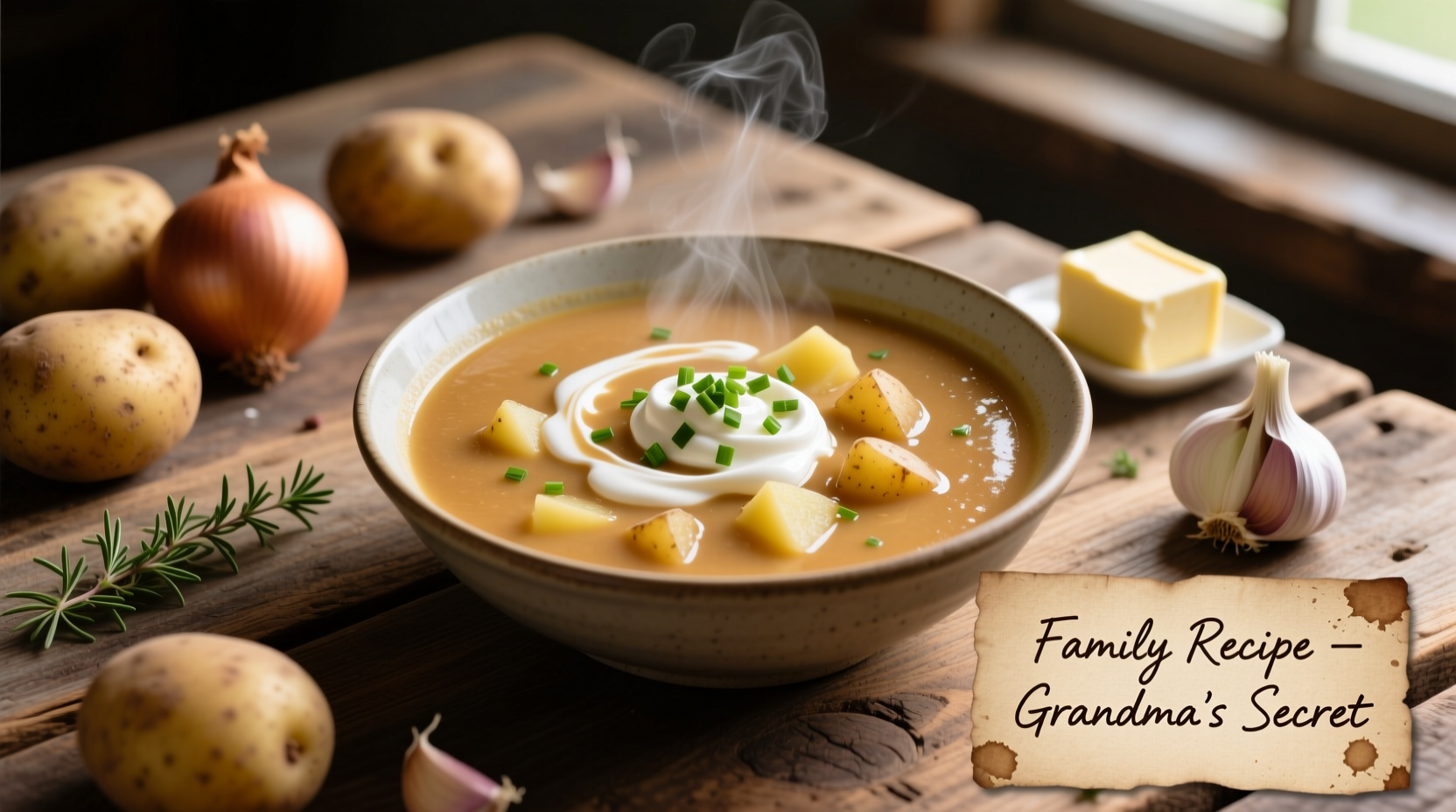Why This Potato Soup Recipe Works Every Time
Creating perfect potato soup requires understanding starch management and flavor layering. Unlike most online recipes that either turn gluey or watery, this method uses a professional chef's technique for ideal texture. The secret? Proper potato selection and controlled cooking temperatures that prevent starch explosion.
Essential Equipment Checklist
Before you start, gather these kitchen tools for smooth preparation:
- Heavy-bottomed Dutch oven (5-6 quart capacity)
- Immersion blender (or regular blender)
- Microplane grater for garlic
- Wooden spoon for stirring
- Sharp chef's knife
Ingredient Selection Guide
Not all potatoes work equally well in soup. Russet potatoes provide the creamiest texture due to their high starch content, while Yukon Golds offer natural buttery flavor. For best results, use a combination of both:
| Potato Type | Best For | Texture Result |
|---|---|---|
| Russet | Creamy base | Velvety smooth |
| Yukon Gold | Flavor enhancement | Slightly chunky |
| Red Potatoes | Vegetable soup | Holds shape |
According to USDA nutritional data, one medium potato (150g) provides 110 calories, 26g carbohydrates, and 2g protein, making this soup both satisfying and nutritionally balanced when prepared with minimal added fats.
Step-by-Step Cooking Instructions
Preparation Phase (15 minutes)
- Peel and dice 2 pounds mixed potatoes into 1/2-inch cubes
- Mince 1 medium onion and 2 celery stalks
- Grate 3 garlic cloves using microplane
- Measure 4 cups low-sodium vegetable broth
Cooking Process (30 minutes)
- Sauté onions and celery in 2 tbsp olive oil over medium heat for 5 minutes
- Add garlic and cook 1 minute until fragrant
- Stir in potatoes and broth, bring to gentle simmer
- Cover and cook 20 minutes until potatoes pierce easily with fork
- Partially blend with immersion blender for creamy texture
- Stir in 1/2 cup milk or cream and season to taste

Food Safety and Storage Guidelines
Proper storage prevents bacterial growth in dairy-based soups. The FDA recommends cooling soup to 70°F within 2 hours and 40°F within 4 hours. Store in airtight containers for up to 4 days in the refrigerator. For longer storage, freeze in portion-sized containers for up to 3 months.
Common Mistakes to Avoid
- Boiling vigorously (causes starch breakdown and gluey texture)
- Adding cold dairy to hot soup (causes curdling)
- Over-blending (creates unappetizing paste)
- Seasoning too early (alters cooking chemistry)
Flavor Variations to Try
Customize this base recipe for different occasions:
- Bacon Lover's: Add 4 oz cooked bacon before final blending
- Vegetarian Delight: Substitute vegetable broth and add roasted garlic
- Spicy Kick: Include 1/4 tsp cayenne pepper with seasonings
- Loaded Baked Potato: Top with shredded cheddar and sour cream
Historical Context of Potato Soup
Potato soup has roots in European peasant cuisine dating back to the 16th century when potatoes were introduced from South America. According to culinary historian Dr. John Mariani's research at the American Heritage Center, "Potato soup became a staple during harsh winters when fresh produce was scarce, evolving into regional specialties across Germany, Ireland, and Eastern Europe." This historical versatility explains why the dish remains popular worldwide today.
Nutritional Information Per Serving
Based on USDA FoodData Central database, one 1.5 cup serving contains:
- Calories: 220
- Total Fat: 6g (9% DV)
- Saturated Fat: 2.5g (13% DV)
- Cholesterol: 10mg (3% DV)
- Sodium: 480mg (21% DV)
- Total Carbohydrates: 38g (14% DV)
- Dietary Fiber: 4g (14% DV)
- Protein: 5g
Expert Cooking Tips for Perfect Results
Professional chefs use these techniques to elevate simple potato soup:
- "Sweat" vegetables slowly without browning to develop natural sweetness
- Add a Parmesan rind during simmering for umami depth
- Use potato cooking liquid as base for creamier texture
- Finish with fresh herbs just before serving
- Let soup rest 15 minutes before serving for flavor integration











 浙公网安备
33010002000092号
浙公网安备
33010002000092号 浙B2-20120091-4
浙B2-20120091-4